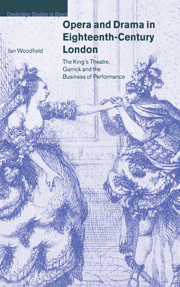 Opera and Drama in Eighteenth-Century London
Opera and Drama in Eighteenth-Century London Published online by Cambridge University Press: 22 September 2009
Considerations on the State of the Stage
As an Act of Parliament passed in the Reign of His late Majesty restricting Theatrical performances, it is proposed to examine into the Cause, as &is not impossible it may be understood to have its rise from a presumption that the Number existing at that time was prejudicial to Society in general: but this was not the Case – for its affects are directly contrary, as can easily be proved from various instances & Reasons – but prior thereto it is fit to shew whence the restriction took its rise, – about the year 1738 a Theatre was opened in Goodmans feilds Wh for some time performed Theatrical Peices unmolested – their success encouraged a Broken Wit (says Cibber) to collect a 4th Compy in the Hay market; who soon finding the best Plays ill performed turned to a bad Accot, thought it necessary to give the Public some extraordinary peices, of such a Specie that no bad Acting coud Spoil; and that from their Nature, shoud, if not draw the attention of the Judicious, at least attract that of the Million (the Mob): under this distress he became Intrepidly abusive and licentious & in several Frank and free Farces, he pelted his Superiours and seemed to Aim at the destruction of every Idea of distinction in Mankind, both on the Heads of Religion, Governmt, Priests, Ministers & Judges; all were leveled by this Draw-cancer in Witt, who Spared neither Friend nor Foe till at last by his own Poetic Fire (like a second Erostratus) he consumed his own Stage, by writing up an Act of Parliament, for the purposes before recited – thus farr Cibber who wrote at the time the Act passed: but it was suspected that this Adventurer was hired to do this dirty business by the Patentees, who possibly were apprehensive if some Check was not given their Emolumts woud soon decrease.
To save this book to your Kindle, first ensure [email protected] is added to your Approved Personal Document E-mail List under your Personal Document Settings on the Manage Your Content and Devices page of your Amazon account. Then enter the ‘name’ part of your Kindle email address below. Find out more about saving to your Kindle.
Note you can select to save to either the @free.kindle.com or @kindle.com variations. ‘@free.kindle.com’ emails are free but can only be saved to your device when it is connected to wi-fi. ‘@kindle.com’ emails can be delivered even when you are not connected to wi-fi, but note that service fees apply.
Find out more about the Kindle Personal Document Service.
To save content items to your account, please confirm that you agree to abide by our usage policies. If this is the first time you use this feature, you will be asked to authorise Cambridge Core to connect with your account. Find out more about saving content to Dropbox.
To save content items to your account, please confirm that you agree to abide by our usage policies. If this is the first time you use this feature, you will be asked to authorise Cambridge Core to connect with your account. Find out more about saving content to Google Drive.